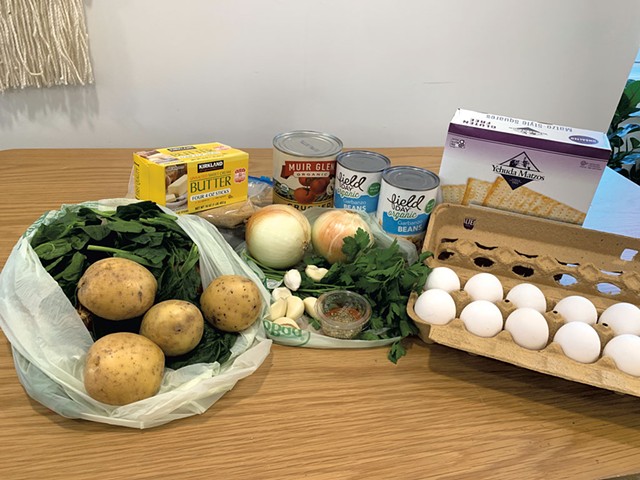
- Melissa Pasanen ©️ Seven Days
- Hillel Fresh ingredients for shakshouka
On a Friday in April, University of Vermont senior Tucker Paron stopped by the campus Hillel at 439 College Street to pick up a free meal kit of locally grown potatoes, onions, spinach and garlic, plus canned tomatoes, spices and eggs. The bag also held a printed pamphlet illustrated with original student art. It contained a recipe for shakshouka, a Middle Eastern dish of eggs and vegetables simmered in spiced tomato sauce; Sabbath prayers in English and in Hebrew (Shabbat); and information on Passover, the Jewish holiday that had just concluded.
Paron said this was the second time he had signed up for what is called a Hillel Fresh meal kit after learning about the program through a guest speaker in one of his courses.
"I'm not Jewish, but they said anyone can participate," the Connecticut native recalled. "I'd always walked past this building but had no idea what Hillel was."
The imposing stone edifice houses the university's chapter of the international nonprofit that supports Jewish students on more than 800 campuses.
Since early 2021, about twice a month during the school year, a student-led Hillel Fresh team has assembled as many as 60 bags and boxes of meal ingredients to feed up to 200 fellow students. Not only do students plan the recipes, source the food and develop the accompanying materials, but some also grow vegetables for the program at the university-owned Catamount Educational Farm in South Burlington during paid summer internships.
As far as UVM Hillel executive director Matt Vogel knows, the school's chapter is the only one in the world to run its own farm. "That is the most Vermont thing possible," Vogel said.
Hillel chapters often host Friday-night Shabbat dinners to which Jewish students and their friends can come for a free meal and a pause at the end of a busy week. During the pandemic, Vogel said, many Hillels offered prepared meals or meal kits so that small groups could continue to celebrate Shabbat together when large gatherings were prohibited.
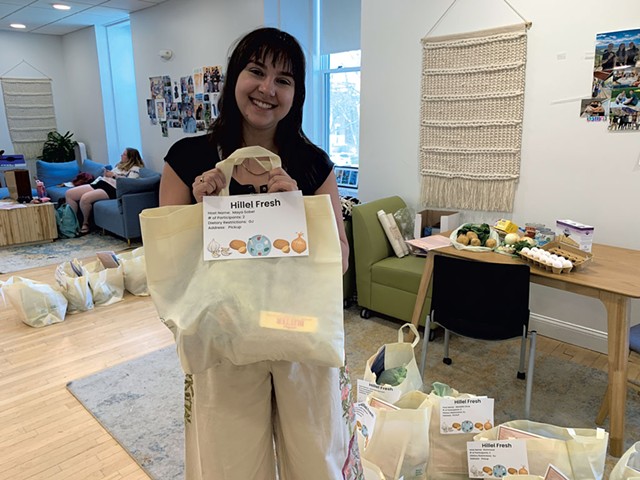
- Melissa Pasanen ©️ Seven Days
- Former Hillel Fresh student director Sophie Sherbin holding a Shabbat meal kit
At UVM, Hillel started providing grocery store gift cards for at-home Shabbat meals in late 2018, after a student expressed concern that the Friday dinners for as many as 100 overwhelmed some attendees. The pandemic led Hillel to offer catered, prepackaged meals for home consumption. That evolved into the current student-directed, ingredients-plus-recipe model, which students named Hillel Fresh in a nod to HelloFresh meal kits.
Hillel has resumed on-site Friday dinners, but the meal kits proved so popular that they remain an option. Although most of those who sign up have a connection to Judaism, the program is open to all students, as Paron learned.
Before he headed out the door of Hillel, bag in hand, Paron pulled out his phone and proudly showed off a photo of the roasted vegetable galette he had made with his first meal kit a couple of weeks earlier.
"My brother and sister are both in town, too, so this is a fun family thing for us to do together," he said. "I won't lie: It's free food," Paron added. "And the fact that it's local and fresh — I've been reading about how that's important."
Hillel Fresh contributes to the nonprofit's mission by providing opportunities for Jewish students to establish their own version of traditions such as Shabbat dinner when far from home. But the free meals do more than that, Vogel said: They create positive relationships with the broader university community and address campus food insecurity by delivering ingredients and simple recipes that help students build cooking skills. Hillel Fresh even stocks some pots and pans to loan out for the year.
The program has become a signature effort of the organization, Vogel said. Its annual budget of $40,000 accounts for just over a third of Hillel's total programming costs, which are all raised through donations. That sum covers everything from seeds and plant starts to printing to ingredients, many sourced from local farms. It also includes stipends for student leaders and the team of seven or eight who work part time in the June-to-October Seeds to Students farming program.
Vogel believes Hillel Fresh is worth every penny. Food has a way of bringing people together, he said. A Jewish student might sign up for a meal kit and cook with non-Jewish roommates.
"This is one of the ways we fight antisemitism — by fostering personal connections to the Jewish experience," Vogel said.
The first of this year's meal kits won't go out until late September, after the Jewish High Holy Days end. Last year, the inaugural recipes were cheesy kale baked potatoes and honey apple salad with lemon-balsamic dressing. The bags contained potatoes and salad greens from Shelburne Farms, apples from Shelburne Orchards and honey from Brooks Bees in Essex Junction, plus student-grown kale and carrots.
"The kale in your bag is extra special because it was planted, grown, harvested, and processed by student interns at the Hillel Fresh farm," read the accompanying materials.
On a drizzly early August morning, three Seeds to Students team members harvested some of this season's crop of kale. While it had also been a bumper year for cucumbers, the carrots had fallen victim to the constant rain. "The seeds washed away," lamented Hillel Fresh student director Sophie Warth, a senior from Orange County, Calif.
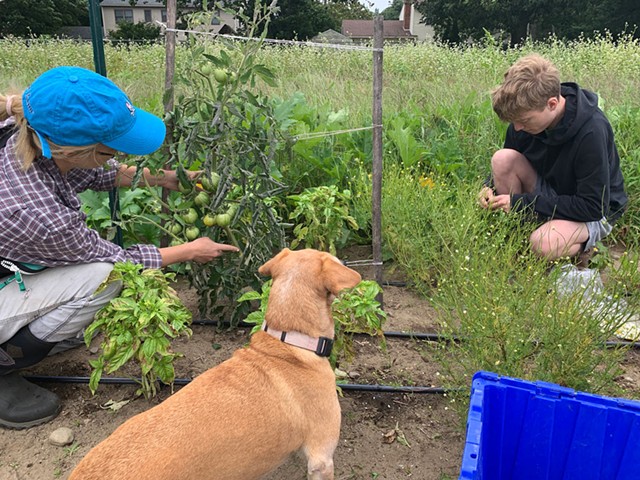
- Melissa Pasanen ©️ Seven Days
- Hillel Fresh farm manager Kate Breimann, her dog Isabel and student intern Robert Ness
The trio was working with Kate Breimann, a UVM graduate student who has served as Hillel Fresh farm manager for all of its three seasons. The size of the plots has tripled since the first year to 300 feet of crop beds. Breimann guides the students with hands-on learning and teaches weekly sessions on different aspects of farming. For example, students learn how to store produce, since the growing season overlaps only briefly with the meal kit schedule.
During those sessions, Warth leads discussions of how Judaism approaches agriculture, food and sustainability. She looks to the Torah (the Hebrew bible), along with Indigenous practices and books such as Farming While Black: Soul Fire Farm's Practical Guide to Liberation on the Land by Leah Penniman, to explore topics such as how "stewardship and ownership are connected to responsibility and care," Warth said.
Warth, who has been involved with Hillel Fresh since her first year at UVM, said students have learned the benefits of planning ahead. She worked closely with Breimann in the spring to develop a crop plan that better matched the needs of the meal kit recipes.
Walking through the rows of vegetables, Warth pointed out the cipollini onions, mini butternut and acorn squashes, and hilled potato plants with pride.
Warth and Breimann decided to grow the mini butternuts based on reactions to the standard size they grew last year. They learned that many student kitchens lack the large, sharp knives required to tackle the big squash. Plus, when cooking for one or two, Warth said, "You're eating it forever."
Indira Fleet, a junior from the Washington, D.C., area, was busy weeding. The outdoor education major spends a lot of time at Hillel and said the Seeds to Students internship was a good fit for her academic and personal interests. "I wanted to learn how to grow food," she said.
Fleet said she has appreciated learning about different farming methods, including companion planting strategies that create natural pest deterrents. "It's a lot more than just planting a seed and watering it," Fleet said.
Robert Ness carefully plucked chamomile buds that would be dried for stress-reducing tea to be distributed during exams. He found community at Hillel after transferring to UVM for the spring semester of his junior year, he said. (He has since left the university for financial reasons and returned home to the Philadelphia area.) Ness said he appreciated the Hillel Fresh meal kits as a recipient and wanted to help grow some of the ingredients: "It's a great way to provide food to those in need."
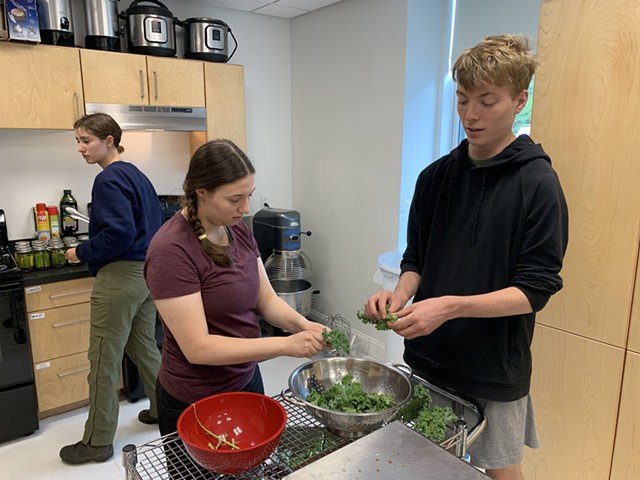
- Melissa Pasenan ©️ Seven Days
- From left: Sophie Warth, Indira Fleet and Robert Ness processing cucumbers and kale for Hillel Fresh
Around 11 a.m., the group loaded the day's harvest into cars and headed to Hillel to work in the kitchen. One of its challenges is preserving the produce for use during the school year. The team made sauerkraut last year, but it developed mold. "It goes really bad really fast," Warth said.
This summer, the students tried to blanch and freeze cabbage leaves for stuffed cabbage rolls, but "they fell apart and were disgustingly wet and soggy," Warth said.
The latest cabbage preservation test involved shredding and then dehydrating, which seems promising for later use in soups or stews.
That day's kitchen task required turning a 17-pound cucumber harvest into pickles. The finished jars would join an impressive stock of pickled goods, including beets, in a Hillel kitchen cupboard.
Warth, Fleet and Ness worked together to wash and cut cucumbers, sanitize jars and lids, and fill them with spices and herbs before adding the cucumbers and pouring in brine. They carefully wiped the jar lips and sealed them.
As Warth processed the jars in a hot water bath, her colleagues moved on to strip kale leaves from their stems to be blanched and frozen.
"It feels good to know I just cut this out of the ground," Ness said. "We know what we're eating from start to finish."
Later, in mid-August, Warth would report that the Seeds to Students team had processed or stored almost 95 pounds of cucumbers, close to 19 pounds of kale and about 60 pounds of onions, along with some beets, cabbage and peppers. She and the team had been brainstorming recipes to which those ingredients might contribute: stuffed peppers and squash, tofu-and-pickle sandwich wraps, a Japanese-style cabbage pancake.
The options were many — and Hillel Fresh recipients would appreciate them all.

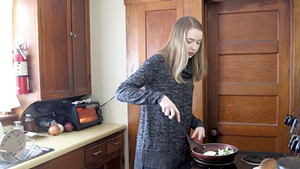









Comments
Comments are closed.
From 2014-2020, Seven Days allowed readers to comment on all stories posted on our website. While we've appreciated the suggestions and insights, right now Seven Days is prioritizing our core mission — producing high-quality, responsible local journalism — over moderating online debates between readers.
To criticize, correct or praise our reporting, please send us a letter to the editor or send us a tip. We’ll check it out and report the results.
Online comments may return when we have better tech tools for managing them. Thanks for reading.